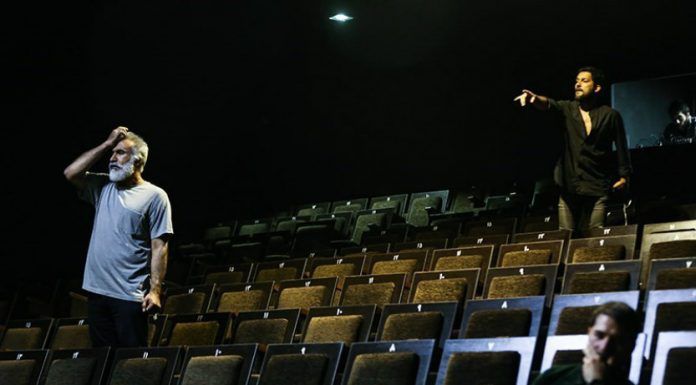There are fewer restrictions on Iranian authors living in the Islamic Republic to write about other countries than their own, Hamidreza Naeimi, playwright, and theatre director has said.
“The only thing that can rescue an apathetic nation are stories and the tradition of storytelling,” Mr. Naeimi said in an interview with the Iranian Labor News Agency (ILNA) late last month. “However, many of my friends are severely censored when they use any parts of the Shahnameh in their work.”
[aesop_image img=”https://kayhanlife.com/wp-content/uploads/2019/07/Detached-folio-from-an-illuminated-manuscript-of-the-Shahnameh-for-Shah-Tahmasp.-The-Sarikhani-Collection.jpg” panorama=”off” credit=”Detached folio from an illuminated manuscript of the Shahnameh for Shah Tahmasp, 1525-1535, Tabriz. The Sarikhani Collection, I.MS.4025.” align=”center” lightbox=”on” captionsrc=”custom” captionposition=”left” revealfx=”off” overlay_revealfx=”off”]
The Shahnameh (Book of Kings) is the epic literary work by the renowned 11th-century Persian poet Abolghasem Ferdowsi Tusi (940-1020 AD).
“I wrote a play titled ‘Zahak Will Not Die’ [a serpent king in the Shahnameh] last year,” Mr. Naeimi said. “After a year of research and writing, I finally submitted the play to the [Ministry of Culture and Islamic Guidance’s] performing arts committee for review. It was a challenging project. I was told, however, that there was no chance of me ever staging it.”
[aesop_image img=”https://kayhanlife.com/wp-content/uploads/2019/10/naemi.jpg” panorama=”off” credit=”Hamidreza Naeimi (R)/ SOURCE: KAYHAN LONDON” align=”center” lightbox=”off” captionsrc=”custom” captionposition=”left” revealfx=”off” overlay_revealfx=”off”]
Naeimi noted: “The public is responsible for the current prevailing atmosphere. Many people spoke out against the film ‘300’ [fictionalizing the Battle of Thermopylae in the Persian Wars, 499-449 BC] when it came out in 2006. Nowadays, however, many of us have become desensitized to events. For instance, we readily ignore any news about someone who has embezzled millions of dollars. Under these circumstances, the only thing that can rescue a nation plagued by apathy is stories and the storytelling tradition.”
“Some people ask me why I stage [Shakespeare’s] ‘Richard III.’ I tell them because I can quickly get a permit to put on that play, even though its narrative is much more controversial than any story about Iran and our history,” Naeimi explained. “It is much harder to get a permit to stage a story from the Shahnameh. For instance, if I write a play about Nader Shah [Afshar, 1688-1747], I probably go to the performing arts committee and tell them about my plan and ask if they would have any objections to the project and its subject, Nader Shah?”
Naeimi noted: “Maybe we do not deserve to inherit the legacy, history, and culture of our ancestors. Senior officials in the country’s cultural institutions do not make informed decisions. If we were a nation that deserved the Shahnameh, then we would have celebrated the glorious names of the heroes of the Book of Kings, including Rostam, Sohrab, Zal, Rudabeh, Manouchehr Shah and others around the world. If we honored those brave souls who without hesitation, gave their lives to defend us against the onslaught of foreigners, then we should have let the world know who we truly are by safeguarding their legacy.”
Speaking about the generation gap, Naeimi said: “We spend our nights playing computer games. Our children are not the result of our shared memories. They are alienated from their fathers. Maybe that is why six million Iranians are living abroad. In their haste to learn one or two foreign languages, our children have forgotten their native tongue.”
“Our children do not detect greatness in their elders. They do not see glory and brilliance in the officials, because they do not hear words such as greatness, glory, brilliance, faith, selflessness, and sacrifice any longer,” Naeimi added. “At night, they see their exhausted and demoralized father go to bed and get up early the next morning to go to work. Their mother is so tired that she cannot read them a bedtime story. Their grandmothers only care about medication to ease their aches and pains. These children are not competent guardians of our past, present, and future.”
“We are all foreigners in this land. It is sad for people to be aliens in their own homes,” he declared.
[Translated from Persian by Fardine Hamidi]


